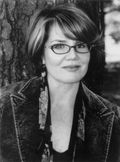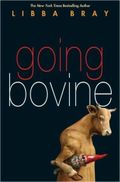An Interview with Libba Bray
When I was asked to host the fabulous Libba Bray on her blog tour, of course I said YES. It is not every writer who will valiantly take to the streets in a cow suit wielding a ukelele to support their artistic vision. Also? I really, really, HUGELY love her new novel, Going Bovine (Amazon/Indiebound), about a teenage boy diagnosed with Creutzfeldt-Jakob Disease (aka mad cow). Just ask the people at Blue Heaven, who I recommended it to over and over again last week. But hey, maybe you need some convincing, or you just like reading fun interviews. Now you're all set, either way.
GB: Tell me about your process while writing Going Bovine, as my readers love a good process ogle. You mention that you originally wrote this for a workshop run by the fabulous Cynthia Leitich Smith (who I was lucky enough to get to work with a bit at Vermont College) and her husband Greg in the acknowledgments; what part did that play? This book obviously enters all new territory for you–was the process of writing it different than how you approached the Gemma Doyle books?
LB: I love the phrase “process ogle.” That’s great. I’ll footnote you when I use it. So the story behind Going Bovine does start with the beauteous Miss Cyn and the dashing Mr. Greg. They ran the most wonderful, warm writers’ workshop in Austin, TX, called WriteFest. Cyn invited me to be a part of it for June 2005. When she rang me up in November 2004, I was on the third draft of my second book, Rebel Angels. She said I would need to submit a complete manuscript to her by May 1st, and I said yes, sure, because at that point, I was so deeply submerged that you could have said, “May I remove one of your kidneys while you type,” and I would have answered, “Uh-huh. Sure. Knives in kitchen.”
Flash forward to February 2005: I’ve finally finished revisions/copy-edits on Rebel Angels and I go, oh crap. I need to write a book. In three months. I am doomed. I call up Cyn and say, “You’re kidding about that complete manuscript bidness, right?” And she, rightly so, says, “No. I am not. May 1st. Get crackin’, missy.” Thank you, Cyn, and your velvet whips. I was really up a creek. The only things I knew for sure were: This was a book about a kid with mad cow disease. It was a road trip novel that would take the characters through the South with a stop in New Orleans. Disney World was involved. It was a way to explore my fears and feelings about existence. And it was loosely based on Don Quixote. That, my friends, is not a royal flush. It’s like one ace, a smattering of low cards, and a joker the dealer accidentally shuffled in.
So I took a trip to New Orleans for research. (Why do I not set books in Tahiti or Rome? Must work on this…) I’d been to NOLA many times, and it was always a special place to me. But I was shocked by the entrenched poverty—and this was six months before the unforgiveable horrors of Katrina. Books have a mood, and that was certainly part of the mood. I started writing in my notebook while riding the cable cars and walking around the graveyards and sitting in the cafes. It felt like I was visiting another planet, in a way. I was there for three days, then I came home and hit the ground running. I think the benefit of only having about 2 ½ months to write a first draft was that I got out of my own way. I didn’t have time to equivocate and feel scared and pull back, overthink, overanalyze myself into a state of paralysis. It was damn-the-torpedoes time. There were moments while writing when I’d shake my head and think, This is never going to work. (In point of fact, some of it didn’t work. The talking penis scene comes to mind. I don’t need to elaborate, do I? No. I didn’t think so.)
At WriteFest, I had a chance to workshop the novel with Cyn, Greg, Anne Bustard and Brian Yansky, taking in their insightful, generous notes. I showed it to my editor, Wendy Loggia at Random House, and she bought it, though if you want to know the true meaning of silence, sit in a conference room with your publisher and editor when you cheerfully announce to them that the follow-up to your Victorian schoolgirl supernatural fantasy series is a funny mad cow disease road trip novel narrated by a profane sixteen-year-old boy. Good times, good times.
And then I had to put the book in a drawer while I wrote the last book in my trilogy, which, as has been documented was like the Bataan Death March without the funny bits. Flash forward again: (really, Going Bovine does concern time travel so this is good practice) In the spring of 2008, I dusted off the manuscript, read everybody’s notes, and started in fresh. Of course, by now, the novel was informed by new ideas, new thoughts. One of the things I love about research is the Six Degrees of Kevin Bacon of it all: You start off looking up string theory and it leads you to many worlds theory and the supercollider and Michio Kaku and Ed Witten. And then, while wanting to know more about the Norse god Balder, you end up finding out aspects of Norse mythology that fit neatly with your story in a wonderful, strange writing kismet. You read up on that, which somehow leads you to Greek mythology and Ovid and Mardi Gras and so on and so on. It’s like turning on your radio late at night listening for far-off signals, feeling thrilled when you manage to pick up some odd program out of Boise or Omaha or Toronto. I love that part.
I wrote a second draft and, in addition to Wendy’s terrific editorial notes, I was helped out by Justine Larbalestier and my Madison, WI, writer pal, Maureen Leary. All of them pointed out my little darlings and my underwritten scenes and the places where I was coasting rather than digging and revealing. The thing about writing, for me, is that it’s always about trying to strip away the filters that lie between me and whatever’s at the heart of that novel, that painful truth I say I want to find but that I really am afraid to uncover. That’s what revision is all about.
So. That’s the story, morning glory. More than you wanted, I’m sure. You’re probably having a “process ogle” hangover now.
GB: Cameron's voice is so strong and nuanced and unique. Did the character come to you pretty much fully formed?
LB: Characters never come fully formed. I wish they did because then I would have more time to eat Swedish fish and paint my toenails in colors not found in nature. However, Cameron’s voice came to me pretty quickly. It was a harsher voice at the start, akin to a teenage Dr. House. But through the writing and rewriting (and rewriting and rewriting), what emerged was a less caustic version with more of the hills and valleys of somebody experiencing his own evolution.
GB: Do you fear the eating of hamburgers and mad cow disease yourself? (Or, more seriously, it's fascinating how funny this novel is while tackling something that is really scary–any kind of disease that attacks identity or sanity.)
LB: I wish I could say I’ve stopped eating beef. I haven’t completely. But I think twice about it now and choose other options often. In all seriousness, researching mad cow disease was so frightening that it has been sort of a wake-up call about my eating habits, about how meat happens in this country. I read one article that suggested that prions, which are the brain-attacking bad guys of mad cow, might play a role in Alzheimer’s, too. Given that Alzheimer’s is a huge factor in my genetic line, that really got me. All I can say is, I’ve started paying more attention to my food, and I tend to go vegetarian a lot more these days. In fact, I think vegetarianism is in my future for a number of reasons.
GB: Disney World–place of magic or terrifying land of terror?
LB: Depends on whether or not the Lost Boys inside the Peter Pan ride have been fed. But I’m gonna put in a vote for magical.
GB: What books/music/movies have you been reading/listening to/watching lately that you'd recommend?
LB: Let’s see. I’ve read Stitches, David Smalls’ amazing and haunting graphic memoir. I loved Natalie Standiford’s How to Say Goodbye in Robot (October 1st pub date) and Rebecca Stead’s When You Reach Me. One of my favorite books of last year is Toby Barlow’s Sharp Teeth, which won the ALEX award. L.A. werewolf noir in verse. It’s awesome. (I’m reading over this and thinking, Man, there is just some fantastic stuff out there right now. Go read, people!) I’m reading Dennis Lehane’s Shutter Island as my airplane reading. I love a good mystery/thriller. Next on my list is David Levithan’s 9/11 novel, Love Is the Higher Law. I’m pals with David, and sometimes I forget what a freaking awesome writer he is because we’re busy being goofy and eating pizza. I read part of this and was reminded very quickly.
Movies are harder, because unless it’s a kids’ movie, I don’t get out that often. NYC babysitters are as expensive as the housing. I did manage to get out to see District 9, which was great, even if it did make Children of Men seem like a Disney musical. I like dark, post-apocalyptic, dystopian things. It’s actually going to be my decorating theme. Why clean when you can just tell everyone, “I’m going for a sort of dystopian decor”? I’d recommend a documentary I watched about a year ago, The Nomi Song, about 1980’s performance artist, Klaus Nomi. I found that very moving—one of those inspirations that made me want to raise my game. And, I’m not gonna lie, my recent NetFlix queue included a guilty pleasure: Highlander. There can be only one.
Music wise, I’ve been bopping along to Frank Portman’s single for his book, Andromeda Klein. It’s a total earworm. Same with the Yeah, Yeah, Yeah’s Mystery Girl. And I’ve been listening to some old stuff, like Chris Whitley, songs from John Hughes movies in tribute, Harry Nilsson (one of my faves to write to), Roy Orbison’s “She’s a Mystery to Me,” a recording of the Widor Toccata, which makes me wish I hadn’t quit piano lessons in eighth grade, a little Sam Cooke, X, Sigur Ros. Led Zeppelin. Because it’s always Zeppelin time.
And I’ve been playing a lot of Beatles Rock Band.
Don’t tell my editor.
Get more of the Libba Bray online tour-stravaganza at:
An Interview with Libba Bray Read More »

